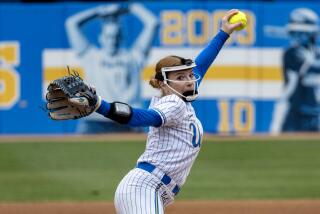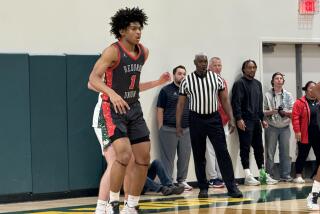Rohde Might Be Ready to Let the Sun Go Down on His Career
- Share via
Sunsets can be breathtaking in Tucson. Desert skies dressed up in magenta and blue, highlighted by white clouds ranging from wispy to puffy. And this is the backdrop to an orange-red sun descending slowly behind the mesas.
But sunsets are supposed to belong to nature. Not to those baseball players who merely tasted the good life--the major leagues--with a teaspoon instead of a ladle.
Dave Rohde, 31, is in the sunset of his career. Rohde, an infielder from Corona del Mar High, is filling a backup role for the Pacific Coast League’s Tucson Toros, the Houston Astros’ triple-A affiliate. He is batting .324 in 30 games. Rohde also holds the Toros’ record for average in a single season (.372 in 1991).
This is Rohde’s 10th professional season. He has had brief major league stops with Houston and Cleveland, the last one coming two years ago. He has gone from being a prospect to being insurance should an Astro become disabled.
Rohde might retire from baseball after this season. He is eager to finish course work for his economics degree at the University of Arizona. Rohde and his wife, Tammy--who until recently worked for the Toros in public relations--are considering starting a family. They have made their home in Tucson, and Rohde has little desire to keep packing a suitcase to chase the baseball rainbow.
“Houston would have to show some genuine interest in me,” he said. “I enjoy playing here and probably wouldn’t play anywhere else. Moving your family around is not worth it when you cannot see future benefits. And I’ve got another 30 years of my life to get some other things done.”
At Corona del Mar, he played third base on the 1981 Southern Section 2-A championship team. The Sea Kings made the semifinals the next year, losing to eventual champion Norwalk.
“It was guys like him that made me a great coach--in my mind at least,” said Tom Trager, Rohde’s coach at Corona del Mar.
“We had an excellent club that year. Dave was third baseman-pitcher who batted second. He was a line-drive hitter, always a good hitter. He could run. Had an outstanding high school arm. A very quiet kid, but coachable and an excellent student. If I had nine of those every year, [Dodger Manager Tommy] Lasorda would have to move over.”
Two years later, Rohde was a member of Saddleback College’s conference championship team. In 1986, he was the starting shortstop on Arizona’s College World Series winner.
“I’m sure the exposure from the series helped me get a pro contract,” said Rohde, Houston’s fifth-round draft selection in 1986.
The championships did not stop there. In 1991, Rohde helped Tucson win the PCL title, batting .372 during the season and .352 in the playoffs. Next season, after being obtained by Cleveland (along with Kenny Lofton) from Houston for Eddie Taubensee and Willie Blair, Rohde batted .295 and helped the Colorado Springs Sky Sox win their first PCL championship.
In nine minor-league seasons Rohde has averaged .282 (892 for 3,166). He has not enjoyed the same level of success in the majors, averaging .158 (23 for 146) in 93 games, but Rohde--who also has been in the Pittsburgh organization as well--wonders if he has ever gotten a real chance to stay.
“When you’re in [Class] A and double-A ball, the big leagues seem so far away,” Rohde said. “I was never highly touted; I bounced from position to position. I took it a year at a time. Now I’ve reached a point where, at triple-A, you start seeing guys who have played some at the majors.
“But the game has kept me young. I always tell people that even if I had never played in the majors I’ve seen the entire country, been to Venezuela and Canada. Not too many people get chance to explore their own country.”
*
There have been 36 players who have stood next to Mariner center fielder Ken Griffey Jr. in his six-year career at Seattle. This year, rookie Darren Bragg was the fifth opening day left fielder in the last five years for the Mariners.
Bragg made an early splash, but has settled to a .235 average in 33 games, with one home run and 20 RBIs. That’s why the Mariners have turned their attention to Marc Newfield, who was called up May 27.
Newfield, 22, graduated from Marina High in 1990 and was in his second year of triple-A baseball at the time of his promotion. He started slowly in Tacoma but had raised his average to .273 in 30 games. Among his 30 hits were seven doubles and four home runs. He had 20 RBIs.
Newfield, who was called up to Seattle for 22 games in 1993, would love to approach the stats he compiled at Calgary last season--.349, 19 homers and 83 RBIs. But the Mariners, who picked Newfield in the first-round (sixth overall) in the 1990 draft, are willing to be patient.
*
A golden opportunity awaits former Orange Coast player Mike Misuraca.
But then a golden opportunity awaits anyone in the Minnesota Twins’ organization who can get the ball over the plate.
The Twins have the worst record in the majors and are hunting desperately for pitching. Misuraca, who is with the Twins’ triple-A affiliate in Salt Lake City, was a borderline candidate to be part of the club’s 40-man roster at the start of the season. Minnesota Manager Tom Kelly saw Misuraca pitch a couple of times during the strike and reportedly liked what he saw.
“It would not be a surprise to see Mike in a Twins uniform before the season is over,” one club official said.
What Misuraca, 26, needs to do soon, however, is put together a series of good outings. In 13 games (12 starts) he is 4-4 with a 4.52 earned-run average. A control artist (17 walks, 35 strikeouts), he has given up 85 hits in 67 2/3 innings.
The PCL is considered a real hitting league, and high ERAs can be overlooked. But Misuraca hasn’t shown a mastery of the league yet.
He was promoted to Salt Lake late last year after posting an 8-4 record with a 3.63 ERA for Nashville in the double-A Southern League. But Misuraca was 3-5 with a 5.21 ERA, giving up 88 hits in 65 2/3 innings.
Now is the time to make his best pitch for the majors.
The Minor League Notebook will run regularly throughout the summer, focusing on Orange County athletes playing in a specific league.
(BEGIN TEXT OF INFOBOX / INFOGRAPHIC)
Pacific Coast League Road Map
A TRIP TO THE MINORS
The Pacific Coast League has undergone more than its share of changes during its long history, thanks in large part to the movement west of major league baseball in the 1950s. Here’s a look at the league, which has been a career stop for such former and current stars as Joe DiMaggio, Billy Martin, Steve Garvey and Tim Salmon:
When formed: 1903, with teams in Los Angeles, Seattle, Oakland, Sacramento, San Francisco and Portland.
Ready to play: In 1915, the Venice team moved back to the Los Angeles community of Vernon, bringing its park along in sections--on rollers.
Moving on: The Dodgers’ move to Los Angeles and the Giants’ move to San Francisco caused the transfer of three franchises in 1958: Hollywood went to Salt Lake City, Los Angeles to Spokane and San Francisco to Phoenix.
Familiar setting: The Los Angeles team played in Wrigley Field, which became the first home of the Angels in 1961.
League Locations
The PCL’s 10 teams include three in Canada, and six of the 10 are affiliated with National League teams. Franchise locations and the major league parent:
A) Edmonton
(Oakland Athletics)
B) Calgary
(Pittsburgh Pirates)
C) Vancouver
(Angels)
D) Tacoma
(Seattle Mariners)
E) Salt Lake
(Minnesota Twins)
F) Las Vegas
(San Diego Padres)
G) Colorado Springs
(Colorado Rockies)
H) Phoenix
(San Francisco Giants)
I) Tucson
(Houston Astros)
J) Albuquerque
(Dodgers)
More to Read
Go beyond the scoreboard
Get the latest on L.A.'s teams in the daily Sports Report newsletter.
You may occasionally receive promotional content from the Los Angeles Times.










